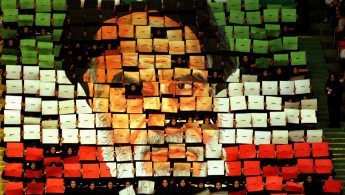Syrian opposition: Arab countries must cut ties with Iran
Saudi Arabia has been rallying Sunni allies to its side in a growing diplomatic row with Iran, deepening a sectarian split across the Middle East following Riyadh's execution of a prominent dissident Shia cleric.
The Turkey-based Syrian National Coalition (SNC) declared its support for Riyadh's move, calling on "all Arab and Islamic countries to take a similar step" and criticised what it said was Iran's support for militias in Syria and Iraq.
Iran supports Syrian President Bashar al-Assad, whose forces, backed also by Russia, are fighting against an array of insurgent groups - including rebels backed by Saudi Arabia and other countries in the region.
On Saturday night, Iranian protesters stormed the kingdom's embassy in Tehran after Saudi Arabia executed Sheikh Nimr al-Nimr.
| Kingdom of Saudi Arabia | Vs | Islamic Republic of Iran | ||
| Population | ~29 million | ~82 million | ||
| Government | Unitary Islamic absolute monarchy | Unitary Presidential Islamic republic | ||
| Muslim population | 90 percent Sunni Muslims, 10 percent Shia Muslims | 90 percent Shia Muslims, 8 percent Sunni Muslims | ||
| Main ethnicity | 90 percent Arab | 61 percent Persian | ||
| Capital punishment | 2nd worldwide in executions per capita | 1st worldwide in executions per capita | ||
| Freedoms | Restricted freedom of speech, persecution of minorities, detains prisoners of conscience, imposes religious dress code on women | Restricted freedom of speech, persecution of minorities, detains prisoners of conscience, imposes religious dress code on women |
Row 'will not affect' Syria talks
But Saudi Arabia has said its decision to break diplomatic ties with Iran will not affect efforts to negotiate peace in Syria and Yemen - where the two regional heavyweights support opposite sides.
Abdullah al-Mouallimi, the Saudi Ambassador to the UN, said on Monday that the row with Tehran "should have no effect" on attempts to end the wars.
 |
We will continue to work very hard towards supporting the peace efforts in Syria [and] in Yemen - Abdullah al-Mouallemi |
 |
"We will continue to work very hard towards supporting the peace efforts in Syria, in Yemen, wherever there might be a need for that," he said.
"How is that going to affect the behaviour of Iran, we do not know, you will need to ask the Iranians for that," Mouallimi told reporters in New York, accusing Tehran of not being supportive of attempts to find peace before this latest falling out between the two nations.
"They have been taking provocative and negative positions and lines, and as such I don't think that the breaking of relations is going to dissuade them from such behaviour."
Syrian talks 'frozen', pending guarantees
The opposition wants to see confidence-building steps from Damascus including a prisoner release before negotiations due this month, officials said on Monday, a demand that could complicate efforts to start the talks.
Opposition leaders, including rebels, plan to deliver that message to the UN envoy for Syria, Staffan de Mistura, when they meet in Riyadh on Tuesday, opposition officials told Reuters.
The United Nations said last month it aimed to bring together the warring parties on January 25 in Geneva to begin talks aimed at ending nearly five years of conflict that has killed an estimated 250,000 people.
 |
Talks must be preceded by real steps on the ground... such as releasing political detainees and stopping the bombardment of towns and cities |  |
George Sabra, a member of the political opposition, said the talks must be preceded by "real steps on the ground that express not only goodwill but also confidence-building measures, such as releasing political detainees and stopping the bombardment of towns and cities by heavy artillery and jets".
A second official said the opposition would tell de Mistura "they can't go to negotiations without Assad doing something serious such as a cease-fire or releasing detainees".
The officials said their demands were in line with the Security Council resolution, specifically its calls for the release of arbitrarily detained people, an immediate halt to attacks on civilians and unhindered humanitarian access.
The UN Security Council resolution appeared to mark a rare show of international unity over a crisis that has divided major powers. The United States says Assad must leave power, while Russia has sent its air force to Syria to help shore up his government's control over western Syria.
The outlook for diplomacy on the Syrian conflict has been further complicated by an escalation in tensions between Saudi Arabia and Iran.
The US State Department said in a statement on Monday that it expects meetings between opposition groups and the regime this month, hoping the diplomatic row between Iran and Saudi Arabia's monarchy will not affect efforts to find a political solution for the Syrian crisis.
Sabra, speaking to Reuters from Riyadh, said the political process could not move ahead in isolation from the war still raging on the ground.
"We don't want to get into negotiations for the sake of negotiations, we want to get into negotiations to reach a real political solution," he said.





 Follow the Middle East's top stories in English at The New Arab on Google News
Follow the Middle East's top stories in English at The New Arab on Google News
![22 Arab countries at COP29 have rejected the targeting of fossil fuels [Getty]](/sites/default/files/styles/image_330x185/public/2024-11/GettyImages-2184289638.jpg?h=199d8c1f&itok=ptHl5bec)
![Dozens of people turned out for the funerals [Getty]](/sites/default/files/styles/image_330x185/public/2024-11/GettyImages-2185229760.jpg?h=e7c891e8&itok=1bctDcE6)
![The UAE is widely suspected of arming the RSF militia [Getty]](/sites/default/files/styles/image_330x185/public/2024-11/GettyImages-472529908.jpg?h=69f2b9d0&itok=Yauw3YTG)